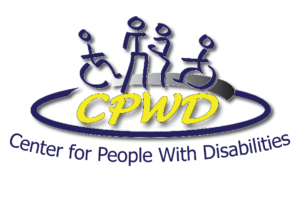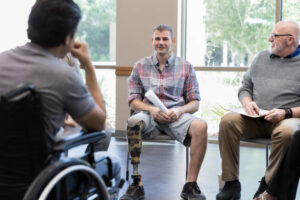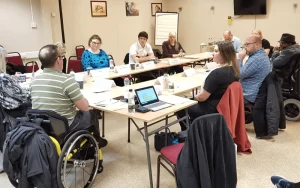Join the CCDC Listening Tour
A Platform for the Disability Community


Images: CCDC and CPWD Logos
The Colorado Cross-Disability Coalition (CCDC) is a leading statewide organization dedicated to advocating for the rights of people with all types of disabilities. CCDC focuses on state government programs, laws, and policies, striving to improve the lives of individuals with disabilities through systemic change. By collaborating with various stakeholders and engaging in policy advocacy, CCDC works to ensure that people with disabilities have equal opportunities and access to essential services.
The CCDC, in collaboration with the Center for People With Disabilities (CPWD), is conducting a Listening Tour to hear from people with disabilities and Medicaid users about their experiences and challenges within our healthcare systems, particularly Medicaid. This is an essential opportunity for individuals to voice their concerns, suggest solutions, and learn about recent and upcoming changes in laws affecting the disability community.
Event Details:
Who: Individuals with any type of disability who use Medicaid
What: A discussion on the issues facing people with disabilities, thoughts on the state Medicaid program, and ideas for solutions
When:
- In Boulder: Wednesday, July 10, 2024, from 1:00 pm to 4:00 pm, at the CPWD Boulder Office, 1675 Range Street, Boulder, CO 80305
- In Longmont: Thursday, July 11, 2024, from 10:00 am to 12:00 pm, at the CPWD Longmont Office, 615 North Main Street, Longmont, CO 80501
Register Here to Participate!

Image: Adult male veteran with a prosthetic leg talks with an individual using a wheelchair user and another older man
Why Attend?
As a member or ally of the disability community it is important to share the challenges you face and propose solutions.
This event is an opportunity to gain insights into recent changes in laws regarding disability and Medicaid, and upcoming changes. You will also learn more about the work of CCDC and CPWD and how you can get involved in advocacy efforts.
During this conversation, you will be asked about:
- Top issues you see facing people with disabilities and any ideas you have for solutions;
- Your thoughts on our state Medicaid program – both the good and the bad – including your ideas on how to solve problems; and,
- The kinds of changes you want to see in Colorado’s systems.
In turn, CCDC leaders will share:
- Recent changes in laws regarding disability and Medicaid, as well as changes coming in the next couple of years;
- The kinds of work they do at CCDC and how they accomplish their mission; and,
- How to fight for disability rights with CCDC’s dynamic community, if you’re interested.
In order to fully take advantage of the platform of discussion being offered at this event, it is important to understand the recent changes to Medicare and Medicaid laws and to know your rights in participating in government. Recent legislative and policy changes in Medicare and Medicaid are set to significantly impact the disability community. Training will be offered on these topics, but to begin, here’s an overview of some of these changes and their implications.
Medicare Changes
Special Enrollment Periods (SEPs):
Effective January 1, 2024, new SEPs allow individuals who lose Medicaid or CHIP coverage to transition smoothly to Medicare Advantage or Part D plans. This includes a 60-day period before and a 90-day period after losing coverage to select a new plan (CMS) (CA Health Advocates) .
Behavioral Health Access:
Medicare Advantage plans must enhance their behavioral health networks. This includes setting minimum standards for clinical psychologists, licensed clinical social workers, and opioid use disorder prescribers. Emergency behavioral health services must now be accessible without prior authorization .
Telehealth Services:
Telehealth coverage has been extended through the end of 2024. This is particularly beneficial for individuals with disabilities who face mobility challenges or live in areas with limited healthcare access .
Nurse Staffing Standards:
New regulations require nursing homes to provide a minimum of 3.48 hours of nursing care per resident per day, including 0.55 hours from a registered nurse. This aims to improve the quality of care in facilities serving Medicare beneficiaries (HHS.gov) .
Medicaid Changes
Medicaid Access and Managed Care:
New rules establish national standards for appointment wait times and improve transparency and accountability. These changes are designed to make Medicaid more accessible and equitable (HHS.gov) .
Home and Community-Based Services (HCBS):
Enhanced payment standards for direct care workers providing HCBS aim to improve service quality and support for those receiving home-based care rather than institutional care (HHS.gov) .
Enrollment and Renewal Simplification:
The processes for enrolling in and renewing Medicaid and CHIP coverage have been streamlined. This includes eliminating waiting periods, extending the time allowed for applicants to provide additional information, and ensuring continuous eligibility for children and youth (HHS.gov) .
Behavioral Health Access in Medicaid:
Medicaid plans must include specific behavioral health service providers and ensure emergency behavioral health services are accessible without prior authorization (HHS.gov) .
These changes are designed to address long-standing challenges faced by individuals with disabilities, such as access to specialized care, continuity of coverage, and support for home-based services. By focusing on health equity, these updates strive to reduce disparities and enhance the overall quality of care for this vulnerable population.
Participating in State and Local Government: Know Your Rights
Participating in state and local government is a key part of advocating for disability rights and ensuring that the voices of people with disabilities are heard. The CCDC Listening Tour includes training on this topic. Here is a brief overview of some key points this training will cover:
Understand Your Rights: Learn how to familiarize yourself with the laws and regulations that protect your rights as a person with a disability. This includes the Americans with Disabilities Act (ADA), which guarantees equal opportunities in public accommodations, employment, transportation, state and local government services, and telecommunications.
Engage in Public Meetings: Attend city council meetings, school board meetings, and other public forums where decisions affecting your community are made. This upcoming listening tour is a prime example. These meetings are opportunities to provide input and ensure that disability concerns are addressed.
Advocate for Change: Work with advocacy groups like CPWD and CCDC to push for legislative changes that benefit the disability community. Effective advocacy can lead to policy changes that improve access to services, enhance quality of care, and promote inclusion.
Utilize Resources: Leverage the resources provided by organizations such as CCDC and CPWD. These organizations offer training, support, and information to help you navigate and influence government processes effectively.
Your perspectives and experiences are crucial in shaping a more inclusive and equitable future for all. We encourage you to join the CCDC Listening Tour to share your insights and learn more about how these changes will affect you and your community.

Image: A group of people with disabilities sitting around a table
Registration for the CCDC Listening Tour is required by June 28, 2024, to accommodate guests’ needs, including accessibility, dietary restrictions, and Spanish interpretation. RSVP by clicking here or copy/paste this link into your browser: https://cpwd.wufoo.com/forms/r1etlgt00iaiuey/.
For questions, please contact CCDC’s Mona Vyas at [email protected] or call 303-357-6430.




